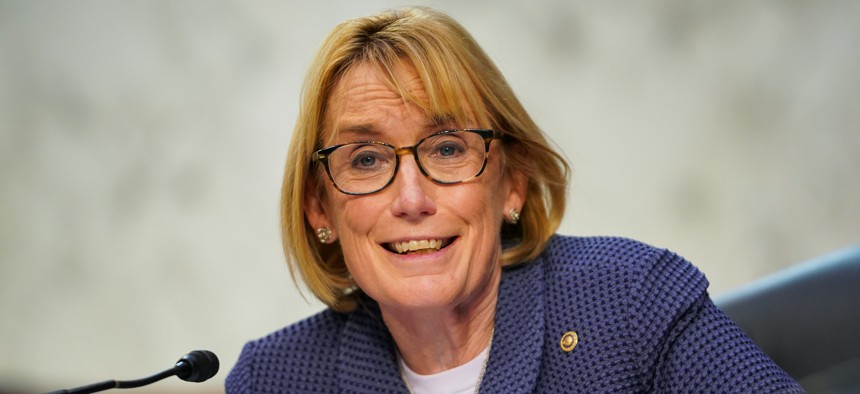Senate committee clears bill that takes on conflicts of interest in federal contracting

WASHINGTON, DC - SEPTEMBER 30: Sen. Maggie Hassan (D-NH) is seen during a Senate Health, Education, Labor, and Pensions Committee hearing to discuss reopening schools during Covid-19 at Capitol Hill on September 30, 2021 in Washington, DC. (Photo by Greg Nash- Pool/Getty Images)
A hearing the committee held leading up to the bill’s markup focused on a shortage of procurement officials in the federal workforce, which an industry witness said could be addressed if it weren’t for inflexible ethics rules.
A bill that would require federal contractors to, among other things, continually disclose potential conflicts of interest passed the Senate Homeland Security and Governmental Affairs Committee.
“Federal contractors like McKinsey have acted against the best interest of our country, communities and citizens, said Sen. Maggie Hassan, D-N.H. “I'm pleased to see that we were able to move forward with Senate bill 3905, the Preventing Organizational Conflicts of Interest in Federal Acquisitions Act, which I co-sponsored.” The bill was introduced by Committee Chairman Gary Peters, D-Mich.
Hassan’s reference to McKinsey Global during a committee business meeting Wednesday regards recent news reports of the firm consulting with entities linked to Russia and China while also advising the Pentagon. Conflict of interest concerns also emerged in connection with McKinsey's role working for opioid manufacturers while simultaneously working with their regulators at the Food and Drug Administration.
“I'm also glad that the committee adopted my amendment that requires that the federal government update its rules to make it clear that individuals doing contract work for a federal agency should not simultaneously work for a business that is regulated by that same agency,” Hassan said.
It’s unclear if the bill—if it were law—would have led to McKinsey’s disclosure of its work with Russian weapons maker Rostec. Hassan said the bill would require contractors’ disclosure “whenever they develop conflicts of interest during their work for federal agencies, not just conflicts that exist at the time that they sign a contract with a federal agency.” A company spokesman told NBC News they didn’t view it as a conflict of interest because they adhere to strict firewalls and that work for the U.S. government is done through a separate legal entity.
During a May 12 hearing of the committee, Grant Schneider, senior director of cybersecurity services for the law firm Venable, addressed what he and fellow witness Soraya Correra—a former chief procurement officer for the Department of Homeland Security who is now president of an eponymous consulting firm—described as a shortage of federal procurement officials.
“You know, we need good strong ethics rules but sometimes they're a barrier for many government jobs, especially for contracting officers who get excluded from being able to work at lots of companies or if they work at a company are excluded from working back in the government,” said Schneider who previously served as the federal CISO. “I think we will be able to retain more people, if we can allow them more flexibility to move back and forth between industry and government, and gain a whole bunch of expertise at the same time.”
During the business meeting, Committee Ranking Member Rob Portman, R-Ohio, thanked the chairman for working to reach an agreement on the bill.
“Remember we had a hearing on federal procurement here just a couple of weeks ago and learned about how difficult it is to find the workforce and some of the challenges they faced in terms of bureaucracy,” he said. “I think what we've agreed to is a good bipartisan compromise.”
Another provision Hassan wanted to include but didn’t propose as an amendment Wednesday aimed to prevent companies that contract with the federal government from sharing information with their private sector clients by ensuring strong penalties if they do.
“I understand that we need additional time to review this amendment to ensure that it is appropriately targeted and incorporates technical feedback from [the Office of Management and Budget],” Hassan said, committing to continued work on the issue, and the amendment, with the committee as the legislation moves forward.
